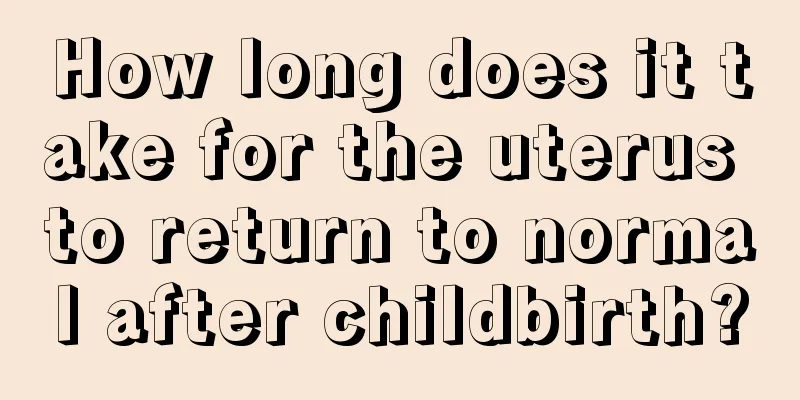What should I do if I bleed while taking birth control pills? Teach you effective coping methods!

|
First of all, I would like to remind all female friends that they must take contraceptive measures during sexual intercourse so that they can avoid taking birth control pills. Because all birth control pills have side effects. For example, some women will experience bleeding after taking birth control pills. A small amount of bleeding is a normal drug reaction. If there is a lot of bleeding, it is abnormal. What should you do at this time? 1. What should I do if I bleed after taking birth control pills? What should I do if I bleed after taking birth control pills? Many women who don’t understand will be very anxious. In fact, bleeding after taking emergency contraceptive pills is normal. Emergency contraceptive pills can delay or advance your next menstrual period. The side effects of emergency contraceptive pills include menstrual disorders, which generally return to normal after 2-3 cycles. Emergency contraceptive pills should only be used occasionally and should not replace regular contraceptive methods. Contraceptive pills should not be used more than three times in a year and can only be used once a month. Other contraceptive measures are best used. Due to individual differences, people's reactions to emergency contraceptive pills may vary. A small number of women will experience vaginal bleeding within a short period of time after taking the medicine. If the amount of bleeding is similar to normal menstrual flow, it can be regarded as a menstrual period. If the amount of bleeding is small, no treatment is needed, but you still need to pay attention to contraception until the next menstruation. 2. What is bleeding after taking birth control pills? Emergency contraceptive pills are different from general contraceptive pills. Taking emergency contraceptive pills causes withdrawal bleeding, and emergency contraceptive pills are a large dose of progestin. Taking them may cause endocrine disorders and lead to menstrual disorders. .Try not to take this medicine in the future. In addition to bleeding, you will also experience the following symptoms. 1. Nausea: The incidence rate varies with different drugs, and nausea generally lasts no more than 24 hours. 2. Vomiting: The incidence rate varies with different drugs. 3. Irregular uterine bleeding: Some women will experience vaginal spotting after taking the medicine, which generally does not require treatment. 4. Menstrual changes: Most women have their periods on time, but some women have their periods early or late. 5. Others: breast tenderness, headache, dizziness, fatigue, etc. These symptoms are generally mild and last no more than 24 hours. Experts remind: After taking oral emergency contraceptive pills, you should not have sex without contraception during this menstrual cycle. If you have sex again, you should use conventional contraceptive methods. If your period is missed, you should go to the hospital and take a pregnancy test to determine whether emergency contraception has failed. 3. How long does it take for menstruation to come after taking birth control pills? Many people bleed after taking birth control pills, which makes their menstruation irregular. So when will the next menstruation be? Emergency contraceptive pills are relatively strong, so they will cause certain changes to the menstrual cycle, which may be advanced or delayed. Repeated use of emergency contraceptive pills will lead to menstrual disorders, bleeding, or prolonged spotting. Bleeding after withdrawal of the drug is equivalent to a menstruation. If the menstrual cycle is normal and will not be delayed, the next menstruation should also come in about a month. How long does it take for bleeding to start before you can get pregnant? It is recommended that you prepare for pregnancy again 3 months or preferably 6 months after stopping taking emergency contraceptive pills. It is safer if the time is too short and the ingredients in the emergency contraceptive pills cannot be completely excreted, so as to avoid teratogenic effects on the fetus. You should start taking 0.4 mg of folic acid every day three months before you prepare for pregnancy. This can prevent fetal malformations to a certain extent, and you can stop taking it when you are three months pregnant. |
<<: Is it easy for people with cold body to conceive?
>>: What to do if mastitis causes pus?
Recommend
What can I eat to make my milk thinner?
Many women think they can be free right after giv...
What causes pain on one side of the breast?
When a woman experiences pain on the right side o...
Can I squeeze out the hard lumps in my milk?
When the baby needs to be weaned, the mother'...
Reasons for delayed menstruation for 10 days
In fact, in daily life, female friends during men...
What medicine is good for uterine cyst?
Female friends are often threatened and harmed by...
Why do I vomit when I'm pregnant?
Because women's hormone secretion increases a...
I gain three pounds during every festive season. What should I do if I gain weight during the Chinese New Year?
As the saying goes, "Every festival makes yo...
Why are my hands swollen at 34 weeks of pregnancy?
Everyone knows that pregnancy is very hard, espec...
Causes of high androgen levels in women
Androgen plays a very important role for us, but ...
What to do if the posterior wall of the placenta is low
When a woman becomes pregnant, there are many thi...
What is the difference between breast swelling before menstruation and pregnancy?
Women may experience breast swelling before their...
Breast skin cellulite picture
When women find abnormal symptoms in their breast...
Why does eating an orange taste bitter after brushing your teeth?
If you eat an orange or drink a glass of orange j...
Can I eat chicken liver while breastfeeding?
Most pregnant women are familiar with chicken sou...
The “protection period” of the new coronavirus antibodies is almost over. Do I need to get vaccinated again?
"As time goes by, the titer of new coronavir...









